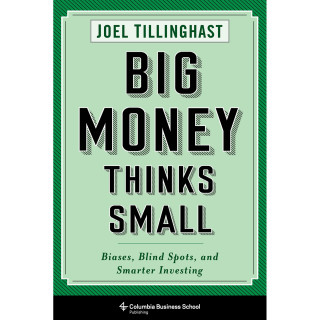5 Traits of Successful Investors
Joel Tillinghast, the author of Big Money Thinks Small, outlines the common qualities of people who make a big profit with investments.

Photo: Neil Webb/Getty Images
1. Trained Intuition
In business, every personality type has a way to make money. But in successful investors, two traits stand out: what psychologists label as thinking and intuitive, or rational analysts. (Note that intuitive is not used here in the popular sense of “trust your gut.” Intuitive is defined as attuned to pattern recognition, meaning, abstract theory, and the invisible, including the future.) Thinking people tend to make decisions based on logic, as opposed to feeling people, who decide based on people and feelings. Everything about the stock market is abstract—trying to guess what the future will bring, and what it means. Without theory, you’ll get nowhere. I would call the combination of thinking and intuitive—grappling with the invisible in a logically consistent way—trained intuition.
2. Emotional Awareness (With Plenty of Reason on the Side)
Good investors tend to favor thinking over feeling and to think rationally. They’re alert to the biases and make an effort not to see facts selectively, overemphasize their importance, or overgeneralize. Where they can, they test hypotheses. They don’t assume their prediction is an absolute fact.
Stoic detachment combined with emotional awareness is the perfect combination for stocks. Feel the fear, but let reason decide. The most frequent blunders come from those who believe everything their gut tells them. The biggest catastrophes come from people who are emotionally unaware when their gut is growling out a correct warning of something amiss. Worrying can be a good thing, if you don’t stress out or feel too intensely. As a value investor, I like to worry when things aren’t going wrong, because the emotional cost is lower. Most importantly, worry only if it will help you to work through the alternatives and find a better path. When the sky is predicted to fall and you can’t save it, relax. Reduce news intake. Be happy.
3. Curious Skepticism
Every skilled investor I’ve met has been curious and a lifelong learner. They read broadly and constantly. For anticipating the future, it’s more important to understand why things happen than what happened. By studying historical examples, I often find that some factors exert more, or less, influence than I would otherwise have thought. And when things happen that have never happened before, I study how others have handled unprecedented events in the past.
Curiosity needs to be balanced with skepticism. Everyone needs a spam filter and a crap detector—some way of classifying and throwing away redundant or wrong information. Things are often not as they seem in finance. Be skeptical and willing to challenge ideas others take for granted.
4. Independent Thinking
On the whole, students with high grade point averages achieve them through curiosity and diligence, but it’s also possible to get high marks by gaming the system, sucking up to professors, and regurgitating whatever they want to hear. In investing, where doing nothing often prevents blunders, a certain style of laziness is adaptive, but mental laziness isn’t, and not thinking independently is absolutely toxic. The entire game is about figuring out what others have missed. The largest prizes go to those who think differently and correctly. Some investing ideas will look stupid or crazy, and a few will be, but the alternative is mediocrity. Depending on the results, you will be called courageous, or arrogant and foolhardy. Don’t be ashamed of error, only of failing to correct it. While university courses are evaluated on, perhaps, three quizzes and a term paper, the stock market never tells you which questions to work on, how to approach them, and whether you’re out in left field.
5. Acceptance of Mistakes
Call it humility, call it honesty with yourself, but failing to admit to investment mistakes means failing investing. When you separate luck from skill, your skill improves. It’s better to be good than to look good. From some perspective, every investor makes mistakes all the time. When I hang tough with a long-term holding when a slump is predictable, I have to concede that a nimble speculator might have spotted my mistake. While speculators’ logic is usually short term, it may be correct for the long run. Psychopaths in investing benefit from not caring about other people, but usually their downfall is their inability to recognize when they are wrong. The ability to admit mistakes can be a barometer of overall truthfulness.
Shrewd speculators and investors study their experience to understand where their hits and misses are coming from and why they might win overall. For example, after being too adventurous with industries I didn’t understand, I now stay away from some and keep positions of others tiny until I know more. My gut identifies many more people as shifty than really are; when I study their corporate accounting, I’m much better at spotting the real bad dudes. Being a coal analyst made me avoid businesses prone to competitive dogfights and obsolescence. In investing, being a cheapskate, and not paying up, helps—a lot. So I win by focusing on simple businesses, with honest management and proprietary products, bought cheaply. But during raging, thematic momentum bull markets, I lag pathetically.
 Excerpted from Big Money Thinks Small by Joel Tillinghast Copyright (c) Joel Tillinghast. Used by arrangement with the Publisher. All rights reserved.
Excerpted from Big Money Thinks Small by Joel Tillinghast Copyright (c) Joel Tillinghast. Used by arrangement with the Publisher. All rights reserved.
In business, every personality type has a way to make money. But in successful investors, two traits stand out: what psychologists label as thinking and intuitive, or rational analysts. (Note that intuitive is not used here in the popular sense of “trust your gut.” Intuitive is defined as attuned to pattern recognition, meaning, abstract theory, and the invisible, including the future.) Thinking people tend to make decisions based on logic, as opposed to feeling people, who decide based on people and feelings. Everything about the stock market is abstract—trying to guess what the future will bring, and what it means. Without theory, you’ll get nowhere. I would call the combination of thinking and intuitive—grappling with the invisible in a logically consistent way—trained intuition.
2. Emotional Awareness (With Plenty of Reason on the Side)
Good investors tend to favor thinking over feeling and to think rationally. They’re alert to the biases and make an effort not to see facts selectively, overemphasize their importance, or overgeneralize. Where they can, they test hypotheses. They don’t assume their prediction is an absolute fact.
Stoic detachment combined with emotional awareness is the perfect combination for stocks. Feel the fear, but let reason decide. The most frequent blunders come from those who believe everything their gut tells them. The biggest catastrophes come from people who are emotionally unaware when their gut is growling out a correct warning of something amiss. Worrying can be a good thing, if you don’t stress out or feel too intensely. As a value investor, I like to worry when things aren’t going wrong, because the emotional cost is lower. Most importantly, worry only if it will help you to work through the alternatives and find a better path. When the sky is predicted to fall and you can’t save it, relax. Reduce news intake. Be happy.
3. Curious Skepticism
Every skilled investor I’ve met has been curious and a lifelong learner. They read broadly and constantly. For anticipating the future, it’s more important to understand why things happen than what happened. By studying historical examples, I often find that some factors exert more, or less, influence than I would otherwise have thought. And when things happen that have never happened before, I study how others have handled unprecedented events in the past.
Curiosity needs to be balanced with skepticism. Everyone needs a spam filter and a crap detector—some way of classifying and throwing away redundant or wrong information. Things are often not as they seem in finance. Be skeptical and willing to challenge ideas others take for granted.
4. Independent Thinking
On the whole, students with high grade point averages achieve them through curiosity and diligence, but it’s also possible to get high marks by gaming the system, sucking up to professors, and regurgitating whatever they want to hear. In investing, where doing nothing often prevents blunders, a certain style of laziness is adaptive, but mental laziness isn’t, and not thinking independently is absolutely toxic. The entire game is about figuring out what others have missed. The largest prizes go to those who think differently and correctly. Some investing ideas will look stupid or crazy, and a few will be, but the alternative is mediocrity. Depending on the results, you will be called courageous, or arrogant and foolhardy. Don’t be ashamed of error, only of failing to correct it. While university courses are evaluated on, perhaps, three quizzes and a term paper, the stock market never tells you which questions to work on, how to approach them, and whether you’re out in left field.
5. Acceptance of Mistakes
Call it humility, call it honesty with yourself, but failing to admit to investment mistakes means failing investing. When you separate luck from skill, your skill improves. It’s better to be good than to look good. From some perspective, every investor makes mistakes all the time. When I hang tough with a long-term holding when a slump is predictable, I have to concede that a nimble speculator might have spotted my mistake. While speculators’ logic is usually short term, it may be correct for the long run. Psychopaths in investing benefit from not caring about other people, but usually their downfall is their inability to recognize when they are wrong. The ability to admit mistakes can be a barometer of overall truthfulness.
Shrewd speculators and investors study their experience to understand where their hits and misses are coming from and why they might win overall. For example, after being too adventurous with industries I didn’t understand, I now stay away from some and keep positions of others tiny until I know more. My gut identifies many more people as shifty than really are; when I study their corporate accounting, I’m much better at spotting the real bad dudes. Being a coal analyst made me avoid businesses prone to competitive dogfights and obsolescence. In investing, being a cheapskate, and not paying up, helps—a lot. So I win by focusing on simple businesses, with honest management and proprietary products, bought cheaply. But during raging, thematic momentum bull markets, I lag pathetically.
 Excerpted from Big Money Thinks Small by Joel Tillinghast Copyright (c) Joel Tillinghast. Used by arrangement with the Publisher. All rights reserved.
Excerpted from Big Money Thinks Small by Joel Tillinghast Copyright (c) Joel Tillinghast. Used by arrangement with the Publisher. All rights reserved.



